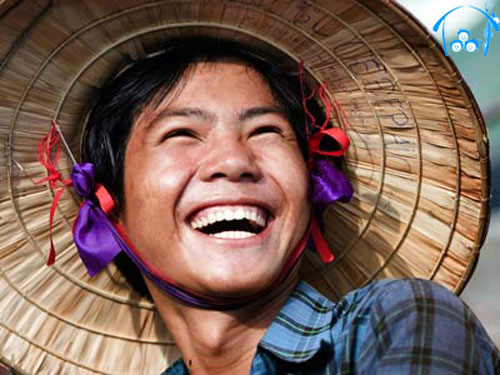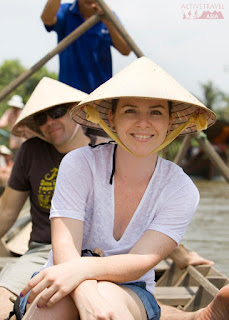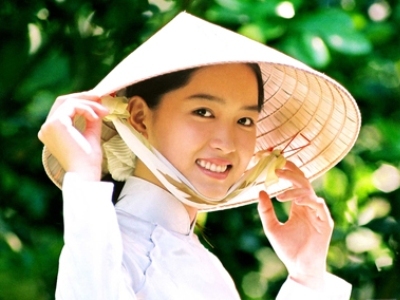 |
| Smile Vietnamese |
Tripatini
the world's smartest travel social network
How to act like a local in Vietnam
The French have their berets, Russians wear their fur hats and Moroccans don the fez. In Vietnam, the conical hat is the head wear of choice. This sturdy, wide-brimmed topper is well suited to a country where rice farmers endure both fierce sunshine and pelting rain out in the fields.
Along with the Vietnamese traditional dress, it has become an informal national symbol. Vietnam is a fascinating country and a highly photogenic one at that. But beyond this - what lies beneath the conical hat?
Quite a lot, if you know anything about Vietnam's thousands of years of history. A hardworking people, their culture has been influenced by many civilisations: the native ethnic groups that once inhabited their land, the Chinese, the French, and most recently, the Americans and Russians. From all these outside influences, plus centuries of war and hardship, their culture has been formed.
SHOW SOME RESPECT
Respect your elders, and your teachers, and everyone else too - this type of attitude is at the very heart of Vietnamese culture. While respect is also valued in Western society, the emphasis is more on friendliness. But it's the cornerstone of interpersonal relationships in Vietnam, whether that be within family, between friends or couples, or in an employment situation.
It's even reflected in the language used by Vietnamese in their daily lives. For example, while in the English-speaking world the word "yes" is used to express agreement and is generally neutral, a Vietnamese person has to choose between three different words to express agreement. In their reply to someone they may mean "yes, I am listening" or "yes, I am confused" or "yes, I do not want to offend."
Saving face is an entrenched part of Vietnamese culture and no more so than in the language itself. Modesty and humility are closely linked to this attitude of respect.
And in Vietnamese culture, older people are deeply revered - unlike Western society, where age is often seen as a liability and youthfulness is celebrated.
I LIKE YOUR SMILE
Expressing yourself verbally tends to come naturally if you're a Westerner, however the Vietnamese prefer non-verbal communication for expressing certain feelings. The humble smile is one such non-verbal symbol - and it's used to convey the all-important attitude of respect.
For the Vietnamese, the smile is a proper response in most situations when verbal expression isn't needed or isn't appropriate. It can be used as a substitute for "I'm sorry", "thank you" or "hello" instead of a ready yes, as the Vietnamese like to avoid appearing over-enthusiastic.
FAMILY TIES
Because Vietnamese society places significant value on stability in social interaction, relationships tend to be very close. The Vietnamese have strong feelings towards their extended family, ancestors, home village and country.
As they believe they must treat their forebears well, many people practice ancestor worship. The building of shrines in homes and burning incense for their deceased family members is common among Vietnamese. They are also very superstitious, believing certain things must happen on certain occasions, or their family will have bad luck.
TELL ME A STORY
The Vietnamese love a good chat and can be very candid when discussing their lives. For instance, when chatting to a local, you might be surprised to discover that many topics that are regarded as personal or confidential in Western culture are openly discussed in Vietnam.
You may be asked about your age, whether or not you're married, whether you have children and how much money you earn.
It might be different from Western society, but then again, it's all about getting beneath the conical hat.
Find out more information to explore Vietnam: http://www.activetravelvietnam.com/vietnam_travel_guides.html
Videos
Groups
-
India
173 members
-
Tour Operators
873 members
-
Ireland
93 members
-
South Dakota
17 members
-
Azerbaijan
17 members
-
Shopping the World
55 members
-
Tech for Travel/Hospital…
87 members
-
Andorra
26 members
-
Online Corner
75 members
-
Minnesota
22 members
-
Backpackers & Hostels
84 members
-
Portugal
60 members
-
Turks and Caicos
26 members
-
Agritourism/Farmstays
72 members
-
Zambia
21 members
© 2025 Created by EnLinea Media.
Powered by
![]()
Badges | Report an Issue | Privacy Policy | Terms of Service


You need to be a member of Tripatini to add comments!
Join Tripatini